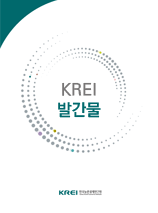
- Issues in Agricultural Policy and Challenge in 2014
-

-
The Korean economy is expected to show a steady recovery and grow by 3.8-4.0 percent in 2014, leading
to an increase in the demand for agricultural products. However, a stronger Korean won and weaker
Japanese yen will make it challenging for the country to export agricultural products. The agricultural policy
authorities and the entire industry need to pay keen attention to changes in macroeconomic indicators.
Major policy issues will include the expansion of market opening in the agricultural sector and complementary
measures in the domestic market, including issues related to Korea-China FTA and TPP
negotiations. The continuous growth of the Chinese economy (with over 7.3 percent of its growth rate)
and the trend of a stronger yuan will serve as an opportunity for Korea to increase the export of its
products.
The low income issue in rural areas is unlikely to be resolved this year due to the stagnation in growth
in the agricultural industry and deteriorated conditions in the agricultural trade. Therefore, the authorities
should make more efforts to expand growth engines and seek for new solutions. Although the population
in rural areas will continue to naturally decrease due to a rapidly aging society, new forms of economic
activities will increasingly emerge, leading to the materialization of the results of the 6th Industry
Invigoration Measures.
In 2014, the key policy challenges include as follows: (1) designing solutions for the low-income issue
and stable management measures in rural areas in response to the expansion of market opening in the agricultural
industry and natural disasters; (2) enhancing the agricultural R&D framework as a foundation
for the development of technology-oriented creative agriculture to overcome a slow-growing trend in the
agricultural industry; (3) laying the groundwork for eco-friendly animal husbandry to accelerate the qualitative
development of the livestock industry, including the competitiveness against imported livestock
products, harmonization with local agriculture, and improvement of living environment; (4) proposing a
complementary measure to enhance the effectiveness of the remedy for the distribution structure of agricultural
products suggested in 2013; (5) strengthening the link between the food industry and agriculture
in response to the expansion of the food market, developing strategic items for the expansion of export
to China through the Korea-China FTA, and establishing the foundation of production; (6) laying the
groundwork for consumer policies in the agri-food sector, including the food safety management that
keeps up with changes in consumer environment and support for the nutrition supply of the underprivileged;
(7) nurturing rural industries and promoting the 6th Industrialization Strategy that connects
production, processing, sales, and consumer experiences altogether by using both tangible and intangible
resources in rural areas and expanding the links among related individuals and organizations; (8) establishing
measures to enhance the quality of life in rural areas, including the 3rd Improvement Plan for
Quality of Life in Rural Areas; (9) reorganizing the living zone by connecting with fostering community
in rural areas; and (10) reinforcing agricultural businesses following the quantitative expansion of the
Official Development Assistance (ODA) projects in the agriculture and forestry sectors, and strengthening
the systematic cooperative network among related institutions. -
목차
요약문
The Korean economy is expected to show a steady recovery and grow by 3.8-4.0 percent in 2014, leading
to an increase in the demand for agricultural products. However, a stronger Korean won and weaker
Japanese yen will make it challenging for the country to export agricultural products. The agricultural policy
authorities and the entire industry need to pay keen attention to changes in macroeconomic indicators.
Major policy issues will include the expansion of market opening in the agricultural sector and complementary
measures in the domestic market, including issues related to Korea-China FTA and TPP
negotiations. The continuous growth of the Chinese economy (with over 7.3 percent of its growth rate)
and the trend of a stronger yuan will serve as an opportunity for Korea to increase the export of its
products.
The low income issue in rural areas is unlikely to be resolved this year due to the stagnation in growth
in the agricultural industry and deteriorated conditions in the agricultural trade. Therefore, the authorities
should make more efforts to expand growth engines and seek for new solutions. Although the population
in rural areas will continue to naturally decrease due to a rapidly aging society, new forms of economic
activities will increasingly emerge, leading to the materialization of the results of the 6th Industry
Invigoration Measures.
In 2014, the key policy challenges include as follows: (1) designing solutions for the low-income issue
and stable management measures in rural areas in response to the expansion of market opening in the agricultural
industry and natural disasters; (2) enhancing the agricultural R&D framework as a foundation
for the development of technology-oriented creative agriculture to overcome a slow-growing trend in the
agricultural industry; (3) laying the groundwork for eco-friendly animal husbandry to accelerate the qualitative
development of the livestock industry, including the competitiveness against imported livestock
products, harmonization with local agriculture, and improvement of living environment; (4) proposing a
complementary measure to enhance the effectiveness of the remedy for the distribution structure of agricultural
products suggested in 2013; (5) strengthening the link between the food industry and agriculture
in response to the expansion of the food market, developing strategic items for the expansion of export
to China through the Korea-China FTA, and establishing the foundation of production; (6) laying the
groundwork for consumer policies in the agri-food sector, including the food safety management that
keeps up with changes in consumer environment and support for the nutrition supply of the underprivileged;
(7) nurturing rural industries and promoting the 6th Industrialization Strategy that connects
production, processing, sales, and consumer experiences altogether by using both tangible and intangible
resources in rural areas and expanding the links among related individuals and organizations; (8) establishing
measures to enhance the quality of life in rural areas, including the 3rd Improvement Plan for
Quality of Life in Rural Areas; (9) reorganizing the living zone by connecting with fostering community
in rural areas; and (10) reinforcing agricultural businesses following the quantitative expansion of the
Official Development Assistance (ODA) projects in the agriculture and forestry sectors, and strengthening
the systematic cooperative network among related institutions.저자정보
저자에게 문의
구매안내
KREI의 출판물은 판매 대행사 (정부간행물판매센터)와 아래 서점에서 구입 하실 수 있습니다.
판매대행사
- (주)정부간행물판매센터http://www.gpcbooks.co.kr사이트 바로가기
- 서울특별시 중구태평로 1가 25번지
- TEL 02) 394-0337, 734-6818
- FAX 02) 394-0339
판매서점
판매서점 교보문고 http://www.kyobobook.co.kr/ 영풍문고 http://www.ypbooks.co.kr/ 알라딘 http://www.aladin.co.kr/ 활용도 정보
활용도 정보 상세정보 조회 좋아요 다운로드 스크랩 SNS공유 5303 0 5 0 0 -
- Suggestions to Promote the Hometown Love Donation System
- Gouk, Seungyong
- 2022.11.25
- KREI 이슈리포트
-
- Ten Years of Korea-U.S. FTA: focusing on agri-food trade
- Kim, Kyungphil
- 2022.06.09
- KREI 이슈리포트
-
- Impacts of Ukraine-Russia Conflict on Global Grain Prices
- Kim, Jongjin
- 2022.03.31
- KREI 이슈리포트
-
- The Impacts of the COVID-19 on the Korean Agricultural Market
- Seo, Hong-Seok
- 2020.06.05
- KREI 이슈리포트
-
- 10 Agricultural Policy Issues of Korea in 2019
- Jeong, Minkook
- 2019.01.29
- KREI 이슈리포트
-
- State of Korean and Overseas Markets for Environment-Friendly Agricultural Products and Challenges 2018
- Jeong, Hakkyun; Sung, Jaehoon; Lee, Hyeonjeong
- 2018.09.12
- KREI 이슈리포트
-
- Measures to Establish the Water-Energy-Food Nexus for Agricultural Resource Management
- Sung, Jaehoon; Cho, Wonju; Lee, Hyeonjeong
- 2018.09.05
- KREI 이슈리포트
-
- Changes in the Trade of Agricultural and Livestock Products and Implications after Seven Years from the Enforcement of the Korea-EU FTA
- Song, Woojin; Lee, Hyunkeun; Myeong, Suhwan; Yoo, Juyoung
- 2018.06.29
- KREI 이슈리포트
-
- 10 Agricultural Policy Issues of Korea in 2018
- Kim, Byoungryul
- 2018.01.22
- KREI 이슈리포트
-
- Income Changes by Type of Farm Household and Implications
- Woo, Byungjoon
- 2017.11.30
- KREI 이슈리포트
-
- Income Changes by Type of Farm Household and Implications
- Woo, Byungjoon
- 2017.11.30
- KREI 이슈리포트
-
- 10 Agricultural Policy Issues of Korea in 2019
- Jeong, Minkook
- 2019.01.29
- KREI 이슈리포트
-
- 10 Agricultural Policy Issues of Korea in 2018
- Kim, Byoungryul
- 2018.01.22
- KREI 이슈리포트
-
- Job Creation Potential for the Youth and Challenges in the Agricultural Industry
- Ma, Sangjin
- 2017.01.01
- KREI 이슈리포트
-
- Implementation Plan and Implications of International Development Cooperation Projects for Agriculture in 2017
- Heo, Jang
- 2017.04.28
- KREI 이슈리포트
-
- 2016 Production Status and Market Prospect of Eco-Friendly Agricultural Products at Home and Abroad
- Jeong, Hakkyun; Lee, Hyejin; Kim, Changgil
- 2016.11.30
- KREI 이슈리포트
-
- The Impacts of the COVID-19 on the Korean Agricultural Market
- Seo, Hong-Seok
- 2020.06.05
- KREI 이슈리포트
-
- Global Spread of Saemaul Undong for Rural Development in Developing Countries
- Heo, Jang; Lee, Yoonjung
- 2016.11.30
- KREI 이슈리포트
-
- Goals and Strategies to Reduce Greenhouse Gas Emissions in the Agriculture Sector
- Jeong, Hakkyun; Kim, Changgil
- 2015.11.03
- KREI 이슈리포트
-
- 70 Years' Achievements and New Challenges of Korean Agriculture and Rural Communities
- Song, Miryung; Moon, Hanpil; Kim, Meebok; Seong, Jooin; Lim, Jieun
- 2015.09.15
- KREI 이슈리포트
의견남기기


